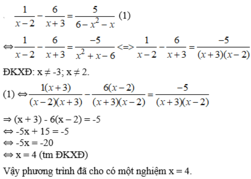Giải các phương trình sau. √x2-6x+9=4-x. √x2-10x+25=3-19x. √x2-9+√x2-6x+9=0. √2x-2+2√2x-3+√2x+13+8√2x-3=5

Những câu hỏi liên quan
Giải các phương trình sau:a)
x
−
6
−
5
x
+
9
;
b)
x
+
1
x
2
+
x
;
c)
x
2
−
2
x...
Đọc tiếp
Giải các phương trình sau:
a) x − 6 = − 5 x + 9 ; b) x + 1 = x 2 + x ;
c) x 2 − 2 x + 4 = 2 x ; d) x 2 − x − 6 x − 1 = x − 2 .
\(|x-6|=-5x+9\)
Xét \(x\ge6\)thì \(pt< =>x-6=-5x+9\)
\(< =>x-6+5x-9=0\)
\(< =>6x-15=0\)
\(< =>x=\frac{15}{6}\)(ktm)
Xét \(x< 6\)thì \(pt< =>x-6=5x-9\)
\(< =>4x-9+6=0\)
\(< =>4x-3=0< =>x=\frac{3}{4}\)(tm)
Vậy ...
\(|x+1|=x^2+x\)
Xét \(x\ge-1\)thì \(pt< =>x+1=x^2+x\)
\(< =>x^2+x-x-1=0\)
\(< =>\left(x-1\right)\left(x+1\right)=0\)
\(< =>\orbr{\begin{cases}x=1\\x=-1\end{cases}\left(tm\right)}\)
Xét \(x< -1\)thì \(pt< =>-x-1=x^2+x\)
\(< =>x^2+2x+1=0\)
\(< =>\left(x+1\right)^2=0\)
\(< =>x=-1\left(ktm\right)\)
Vậy ...
Xem thêm câu trả lời
giải các bất phương trình sau
a, <x-3>*<x2+x-20>≥0
b, x2-4x-5 /2x+4 ≥0
c, -1/x2-6x+8≤1
a, \(\left(x-3\right)\left(x^2+x-20\right)\ge0\)
\(\Leftrightarrow\) \(\left(x-3\right)\left(x-4\right)\left(x+5\right)\ge0\)
+) \(x-3=0\Leftrightarrow x=3\); \(x-4=0\Leftrightarrow x=4\); \(x+5=0\Leftrightarrow x=-5\)
+) Lập trục xét dấu f(x) (Bạn tự kẻ trục nha)
\(\Rightarrow\) Bpt có tập nghiệm S = \(\left[-5;3\right]\cup\) [4; \(+\infty\))
b, \(\dfrac{x^2-4x-5}{2x+4}\ge0\)
\(\Leftrightarrow\) \(\dfrac{\left(x-5\right)\left(x+1\right)}{2x+4}\ge0\)
+) \(x-5=0\Leftrightarrow x=5\); \(x+1=0\Leftrightarrow x=-1\); \(2x+4=0\Leftrightarrow x=-2\)
+) Lập trục xét dấu f(x)
\(\Rightarrow\) Bpt có tập nghiệm S = (-2; -1] \(\cup\) [5; \(+\infty\))
c, \(\dfrac{-1}{x^2-6x+8}\le1\)
\(\Leftrightarrow\) \(\dfrac{\left(x-3\right)^2}{\left(x-4\right)\left(x-2\right)}\ge0\)
+) \(x-3=0\Leftrightarrow x=3\); \(x-4=0\Leftrightarrow x=4\); \(x-2=0\Leftrightarrow x=2\)
+) Lập trục xét dấu f(x)
\(\Rightarrow\) Bpt có tập nghiệm S = (\(-\infty\); 2) \(\cup\) (4; \(+\infty\))
Chúc bn học tốt!
Đúng 2
Bình luận (0)
giải các phương trình sau:
a) (2x-3)2=(x+1)2
b) x2-6x+9=9(x-1)2
c) x2+2x=(x-2)3x
d) x3+x2-x-1=0
e) (x+1)(x+2)(x+4)(x+5)=40
\(a,\left(2x-3\right)^2=\left(x+1\right)^2\\ \Leftrightarrow\left(2x-3\right)^2-\left(x+1\right)^2=0\\ \Leftrightarrow\left(2x-3+x+1\right)\left(2x-3-x-1\right)=0\\ \Leftrightarrow\left(3x-2\right)\left(x-4\right)\\ \Leftrightarrow\left[{}\begin{matrix}3x-2=0\\x-4=0\end{matrix}\right.\\ \Leftrightarrow\left[{}\begin{matrix}3x=2\\x=4\end{matrix}\right. \\ \Leftrightarrow\left[{}\begin{matrix}x=\dfrac{2}{3}\\x=4\end{matrix}\right.\)
Vậy \(x\in\left\{\dfrac{2}{3};4\right\}\)
Đúng 0
Bình luận (0)
\(b,x^2-6x+9=9\left(x-1\right)^2\\ \Leftrightarrow\left(x-3\right)^2=9\left(x-1\right)^2\\ \Leftrightarrow\left(x-3\right)^2-9\left(x-1\right)^2=0\\ \Leftrightarrow\left(x-3\right)^2-3^2\left(x-1\right)^2=0\\ \Leftrightarrow\left(x-3\right)^2-\left[3\left(x-1\right)\right]^2=0\\ \Leftrightarrow\left(x-3\right)^2-\left(3x-3\right)^2=0\\ \Leftrightarrow\left(x-3+3x-3\right)\left(x-3-3x+3\right)=0\\ \Leftrightarrow-2x\left(4x-6\right)=0\\ \Leftrightarrow\left[{}\begin{matrix}-2x=0\\4x-6=0\end{matrix}\right.\\ \Leftrightarrow\left[{}\begin{matrix}x=0\\4x=6\end{matrix}\right.\\ \Leftrightarrow\left[{}\begin{matrix}x=0\\x=\dfrac{3}{2}\end{matrix}\right.\)
Vậy \(x\in\left\{0;\dfrac{3}{2}\right\}\)
Đúng 0
Bình luận (0)
Viết các đa thức sau thành tích 1. x2 - 6x + 92 25 + 10x + x23. dfrac{1}{4}a2 + 2ab2 + 4b44 dfrac{1}{9}-dfrac{2}{3}y4 +y85 x3 + 8y36 8y3 -1257 a6-b38 x2 - 10x + 259 8x3 - dfrac{1}{8}10 x2 + 4xy + 4y2
Đọc tiếp
Viết các đa thức sau thành tích
1. x2 - 6x + 9
2 25 + 10x + x2
3. \(\dfrac{1}{4}\)a2 + 2ab2 + 4b4
4 \(\dfrac{1}{9}\)-\(\dfrac{2}{3}\)y4 +y8
5 x3 + 8y3
6 8y3 -125
7 a6-b3
8 x2 - 10x + 25
9 8x3 - \(\dfrac{1}{8}\)
10 x2 + 4xy + 4y2
1. x2 - 6x + 9=(x-3)2
2. 25 + 10x + x2=(x+5)2
3. \(\dfrac{1}{4}a^2+2ab^2+4b^4=\left(\dfrac{1}{2}a+2b^2\right)^2\)
4.\(\dfrac{1}{9}-\dfrac{2}{3}y^4+y^8=\left(\dfrac{1}{3}-y^4\right)^2\)
5.x3 + 8y3=(x+8y)(x2-8xy+64y2)
6.8y3 -125=(2y-5)(4y2+10y+25)
7.a6-b3=(a2-b)(a4+a2b+b2)
8 x2 - 10x + 25=(x-2)2
Đúng 0
Bình luận (0)
1) \(x^2-6x+9=\left(x-3\right)^2\)
2) \(25+10x+x^2=\left(5+x\right)^2\)
3) \(\dfrac{1}{4}a^2+2ab+4b^4=\left(\dfrac{1}{2}a+2b^2\right)^2\)
4) \(\dfrac{1}{9}-\dfrac{2}{3}y^4+y^8=\left(\dfrac{1}{3}-y^4\right)^2\)
5) \(x^3+8y^3=\left(x+2y\right)\left(x^2-2xy+4y^2\right)\)
6) \(8y^3-125=\left(2y-5\right)\left(4y^2+10y+25\right)\)
7) \(a^6-b^3=\left(a^2-b\right)\left(a^4+a^2b+b^2\right)\)
8) \(x^2-10x+25=\left(x-5\right)^2\)
9) \(8x^3-\dfrac{1}{8}=\left(2x-\dfrac{1}{2}\right)\left(4x^2+x+\dfrac{1}{4}\right)\)
Đúng 0
Bình luận (0)
Bài 2: Giải các phương trình sau:
a) \(\frac{10x+3}{12}=1+\frac{6+8x}{9}\) b) (x2 – 25) + (x – 5)(2x – 11) = 0
c) (x2 – 6x + 9) – 4 = 0 d) \(\frac{x+3}{x+1}+\frac{x-5}{x}=2\)
Giải Phương Trình sau:
a, (3-x)=(3-x)^2
b, x^3-0,25x=0
c, x2-10x=-25
a, (3 - x) = (3 - x)2
Suy ra 3-x = 1 hoặc 3-x = 0
--Nếu 3-x = 1
x = 3-1
x = 2
--Nếu 3-x = 0
x = 3 - 0
x = 3
Vậy x=2; x=3
b, x3 - 0,25x = 0
x.(x2 - 0,25) = 0
Suy ra x = 0 hoặc x2 - 0,25 = 0
x2 = 0 + 0,25
x2 = 0,25
x2 = (0,5)2
Suy ra x = 0,5
Vậy x = 0; x = 0,5
c, x2 - 10x = -25
x.(2 - 10) = -25
x.(-8) = -25
x = -25 : (-8)
x = 25/8
Vậy x = 25/8
Chúc bạn học tốt
Đúng 0
Bình luận (0)
Xem thêm câu trả lời
Giải các phương trình sau: 2 x 2 – x = 3 – 6x
2 x 2 – x = 3 – 6x
⇔ 2 x 2 – x + 6x – 3 = 0
⇔ (2 x 2 + 6x) – (x + 3) = 0
⇔ 2x(x + 3) – (x + 3) = 0
⇔ (2x – 1)(x + 3) = 0
⇔ 2x – 1 = 0 hoặc x + 3 = 0
2x – 1 = 0 ⇔ x = 1/2
x + 3 = 0 ⇔ x = -3
Vậy phương trình có nghiệm x = 1/2 hoặc x = -3
Đúng 0
Bình luận (0)
Giải các bất phương trình sau: x 2 + 9 > 6 x
x 2 + 9 > 6 x ⇔ ( x - 3 ) 2 > 0 (đúng với mọi x)
Đúng 0
Bình luận (0)
Giải các phương trình sau: 1 x - 2 - 6 x + 3 = 5 6 - x 2 - x






















